The University of Chicago Press, Chicago 60637
The University of Chicago Press, Ltd., London
2019 by The University of Chicago
All rights reserved. No part of this book may be used or reproduced in any manner whatsoever without written permission, except in the case of brief quotations in critical articles and reviews. For more information, contact the University of Chicago Press, 1427 E. 60th St., Chicago, IL 60637.
Published 2019
Printed in the United States of America
28 27 26 25 24 23 22 21 20 19 1 2 3 4 5
ISBN -13: 978-0-226-65561-1 (cloth)
ISBN -13: 978-0-226-65575-8 (paper)
ISBN -13: 978-0-226-65589-5 (e-book)
DOI : https://doi.org/10.7208/chicago/9780226655895.001.0001
Library of Congress Cataloging-in-Publication Data
Names: Blunt, Robert W., author.
Title: For money and elders : ritual, sovereignty, and the sacred in Kenya / Robert W. Blunt.
Description: Chicago ; London : The University of Chicago Press, 2019. | Includes bibliographical references and index.
Identifiers: LCCN 2019012197 | ISBN 9780226655611 (cloth : alk. paper) | ISBN 9780226655758 (pbk. : alk. paper) | ISBN 9780226655895 (e-book)
Subjects: LCSH : KenyaPolitics and government20th century. | KenyaPolitics and government21st century. | KenyaReligion.
Classification: LCC DT 433.575. B 595 2019 | DDC 967.62/03dc23
LC record available at https://lccn.loc.gov/2019012197

This paper meets the requirements of ANSI / NISO Z 39.481992 (Permanence of Paper).
Introduction
According to both international onlookers and many Kenyans, the election of Mwai Kibaki in 2003 was supposed to usher in a more stable and dependable government than that of his predecessor Daniel arap Moi (19782002). Kibaki united disparate parties under the banner of the National Alliance Rainbow Coalition (NARC), a clear distinction to the Kenya African National Union (KANU), the party that had been in power since independence. In what might be described as the least ethnic election in Kenyas short history of multiparty politics (Kenya was a one-party state until the early 1990s), Kibaki defeated his fellow Kikuyu, Uhuru Kenyatta, whom Moi had handpicked as his successor on the basis of presenting a youth candidate.
It would turn out, however, that Kibakis coalition was glued together with fragile adhesives. Before his election, Kibaki had signed a memorandum of understanding (MOU) with his key coalition partners to decentralize executive power in the drafting of a new constitution. The MOU included a power-sharing agreement with Raila Odinga, the powerful head of the Liberal Democratic Party, NARCs most important coalition partner. Previous versions of the draft constitution had included legal provisions for both a president popularly elected by Kenyans and a prime minister elected by Kenyas parliament. However, led a successful revolt against what was supposed to be Kibakis crowning achievement, a new constitution. The constitutional referendum was soundly defeated.
Although Kibaki failed to introduce a new constitution retaining exceptional executive powers of the past (on paper anyway), he nonetheless further ratified what was arguably the main fait accompli of Mois governmentthe lifting of the states imprimatur from its official signs and processes while nonetheless continuing to perform a model of elderhood from which this imprimatur was popularly and tacitly held to emanate. After independence in 1963, Kenyas first president, Jomo Kenyatta, had fashioned himself into the Mzee (the Kiswahili honorific for old man), both the generative father of the nation and the ultimate guarantor of Kenyas development-oriented modernity. Fast forward to the period beginning in the 1980s until the end of KANU rule in 2002. During this period, Kenyas second president, Daniel arap Moi, initiated a new era of ruse and dissimulation catalyzed by conditions of scarcity instigated by the rise of neoliberalism and Kenyas changing postCold War relationship to the United States and Britain. Under Moi, state performances of largesse certainly resembled the baroque rituals of Kenyattas robust patrimonial state, but their spectacular nature masked an ongoing liquidation of the commons. In this same vein, Kibaki inherited what would come to be called the Anglo-Leasing scandal from Mois KANU government.
Premised on the need to improve security and antifraud infrastructure, Anglo-Leasing Finance was a British company (along with several other similar firms), which had bid on these security-related tenders during the Moi era. New forensics labs, a brand-new passport verification system, and even naval ships were contracted for purchase by the Kenyan government. In the case of the passport system and forensic laboratories, a French company agreed to provide them for the sum of six million Euros. However, Anglo-Leasing Finance was awarded the contract for thirty million Euros even though they would eventually subcontract this work to the same French firm that had put in a bid of six million. Apart from ALF overcharging the Kenyan government by 500 percent, most of the infrastructure contracted for never materialized, and most of the companies involved in what was essentially a noncompetitive bidding process turned out to be a series of interlinked ghost companies connected to several key figures in Kibakis government (including, most notably, internal security minister Chris Murungaru and vice president Moody Awori). The contours of the Anglo-Leasing scandal mirrored those of the Moi era. Powerful state actors falsified the states imprimatur, effectively counterfeiting key official signs and processes at a cost to Kenyans of billions of shillings.
Critics of corruption and political scientists armed with rubrics for fragile states might look at the Kibaki regime and highlight a familiar litany of crimes: the use of public office for private gain, the attempt to maintain a constitutional structure lopsided toward the executive, and so on. Yet such efforts to list failures of governance and fiscal management themselves fail to explain what these putative crimes mean to ordinary Kenyans. Such taxonomic and reductionist tendencies fail to inquire into the vocabularies, genres, and forms though which Kenyans express their own political understandings, make sense of governance, and articulate what they expect from the sovereigns they often refer to as the wazee (Kiswahili for the old men).
In Its Our Turn to Eat, Michela Wrongs account of Kibakis former anticorruption czar John Githongo, she captures these continuities between the Moi and Kibaki eras through T. E. Lawrences own disillusionment with the architects of British Empire after the Arab revolt in 1916. Yet, when we achieved and the new world dawned the old man came out again and took our victory to re-make in the likeness of the former world they knew... Youth could win but had not learned to keep: and was pitiably weak against age (Wrong 2009, xi). Yet it bears asking: what exactly was this world that the old man in Kenya sought to remake? And what exactly distinguishes old men as such? The answer to both these questions, I argue, is more complex than anything that the category of corruption can convey. It requires a shift of analytical attention to the more mundane forms of everyday life Kenyans inhabit.



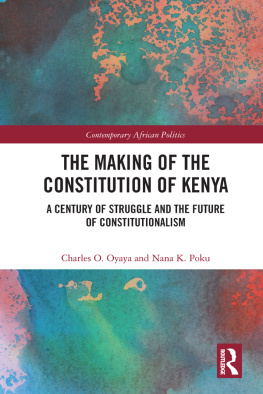
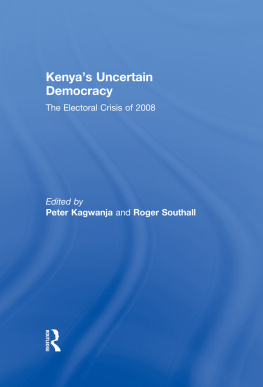
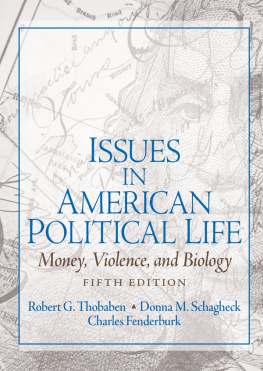

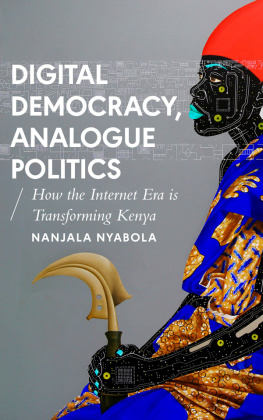
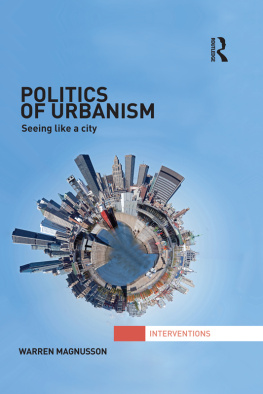

 This paper meets the requirements of ANSI / NISO Z 39.481992 (Permanence of Paper).
This paper meets the requirements of ANSI / NISO Z 39.481992 (Permanence of Paper).